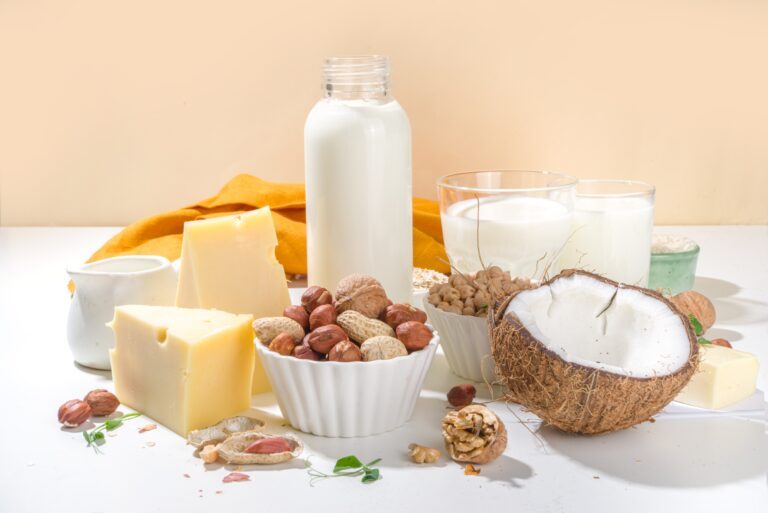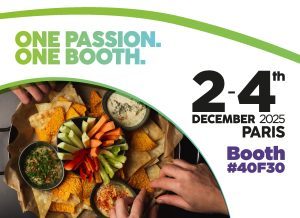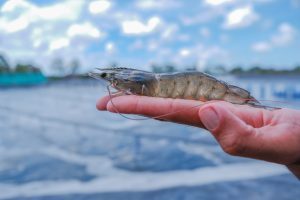Due to the expanding environmental awareness worldwide, plant-based diets are on the rise. According to Euromonitor research (2020)¹, vegans and vegetarians represent 4% and 6.4% of global consumers, respectively. However, a larger group, comprising 42% of global consumers, are flexitarians, that is, people who limit but do not eliminate the consumption of animal products. These individuals are driving the plant-based food market, seeking to diversify their diets with more plant-based options.
Consequently, the market for dairy-alternative foods and beverages has experienced significant growth. The key drivers are health issues, such as lactose intolerance, and growing environmental and animal welfare concerns. Consumers also demand products with ethical and sustainable credentials that ensure that they do not harm the environment. According to a Mintel report, 21% of US plant-based food consumers do so for environmental, and 16% do so for animal welfare reasons.²
The food industry has responded to those trends by developing various products that mimic milk or cheese flavor, texture, and nutritional value and are made of diverse plant sources, such as soybeans, almonds, oats, and rice.
Those market changes have raised consumer expectations, and consumers are looking for options that are not only sustainable and nutritious but also tasty.
THE IMPORTANCE OF TASTE AND TEXTURE IN PLANT-BASED DAIRY BEVERAGES AND CHEESES
Consumers who typically purchase dairy alternatives do so primarily for health reasons. The main reasons US consumers purchase dairy-alternative products vary and reflect their needs³:
- 47% say they taste good;
- 36% consider them healthier than dairy products
- 35% believe they are good protein sources
- 35% say a member of the household has lactose intolerance
However, taste is a barrier for plant-based drinks and cheeses. People are interested in products with the same taste and texture as animal milk and cheese.
In a Mintel survey, 37% of Brazilians say they would eat more plant-based cheese if it “tasted like regular cheese,”4 while 40% of US adults who do not use dairy alternatives say that taste is the deterrent.5
Therefore, plant-based alternatives that closely mimic dairy products, have an adequate nutritional profile, an irresistible flavor, and a pleasant texture, and use ingredients easily recognizable by consumers will have greater prominence in the market.
HOW YEAST CAN TRANSFORM THE TASTE OF PLANT-BASED FOODS
Consumers of dairy alternative beverages also seek products with low additive content, such as sugar and colorings, as they usually contain added sugars to replicate sweetness, unlike dairy milk, which contains natural sugars.
According to a Mintel survey, 58% of Spanish consumers agree that sugar-free dairy alternatives are more attractive than sweetened ones (containing sugar or sweeteners).6 Therefore, manufacturers have highlighted the absence of artificial sweeteners in packaging and have sought to adapt their formulations to maintain desirable flavors and textures.
The main challenge of the plant-based food industry is to create products that mimic dairy products as closely as possible, enhancing their nutritional profile, flavor, and texture, replicating their functionality, and maintaining their clean-label claim.
Biorigin‘s natural ingredients highlight dairy and toasted notes (such as coffee and chocolate), add flavor, creaminess, and mouthfeel, and offset the flavor of low-sodium and sugar recipes.
These solutions can be applied to vegan products to mask undesirable plant notes, enhance the overall flavor, and create dairy notes and creaminess.
Discover our ingredients for tasty plant-based recipes:
- Bionis: Derived from selected strains of the yeast Saccharomyces cerevisiae, Bionis is Biorigin’s versatile line of yeast extracts that adds and enhances the flavor of formulations, providing body and mouthfeel and balancing and rounding off the natural Umami flavor of several food and beverage applications.
- Goldcell: Versatile yeast line. It can be applied to different food categories, contributing to its flavor. Some products from the Goldcell line can also act as a nutrient and vitamin source to stimulate the wine fermentation process, for instance.
Lara Gazolla de Rezende, Food Products Specialist at Biorigin, shares an interesting insight: “Yeast extract is an exceptional ingredient and has stood out in plant-based product formulations. Responding to growing market demands, its use in formulations provides several advantages. In addition to contributing to the product’s nutritional profile balance, whether by reducing sugar and sodium or increasing protein content, yeast extract also significantly enhances its flavor. It effectively masks many of the off-flavor notes present in most plant-based proteins. Furthermore, it is clean label, 100% natural, meeting consumer expectations for “healthier and more transparent products.”
Companies that can meet those demands for plant-based products will be well-positioned to succeed in this expanding market.
DISCOVER BIORIGIN
For more than 20 years, Biorigin has applied its knowledge and experience in biotechnology to make the best of the yeast fermentation process, aiming to develop, together with its partners, the best flavor solutions for healthy and convenient foods cleanly and sustainably.
All our ingredients are derived from natural sources and do not contain animal products. They have Non-GMO Project Verified, Bonsucro’s sustainability, Kosher, and Halal certifications. They can be used in a wide range of foods and beverages. They are suitable solutions for vegetarian and vegan initiatives, enhancing their overall taste and texture and allowing fat, sugar, and sodium reduction. To learn more and request a sample of our products, visit our website.
References:
¹ Euromonitor – Going Plant-Based: The Rise of Vegan and Vegetarian Food (November/2020)
² Mintel – The Protein Report: Meat and Meat Alternatives (US – 2022)
³ Mintel – Dairy Alternatives (US – 2023)
4 Mintel – Cheese and Alternatives (Brazil – 2024)
5 Mintel – A year of innovation in plant-based drinks, yogurt & ice cream (2022)
6 Mintel – A year of innovation in dairy & non-dairy drinks (2024)








